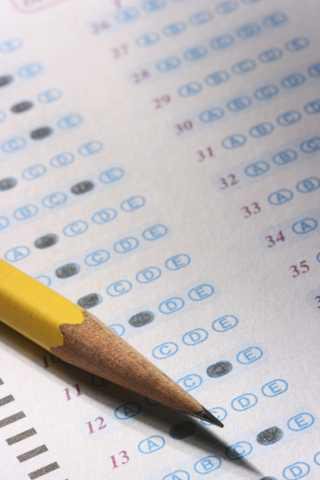![]() The trial of Atlanta teachers accused of falsifying test scores to meet ambitious progress targets is now underway. Some teachers facing up to 35 years in prison, the Los Angeles Times reports.
The trial of Atlanta teachers accused of falsifying test scores to meet ambitious progress targets is now underway. Some teachers facing up to 35 years in prison, the Los Angeles Times reports.
"Atlanta Public Schools was once hailed as one of the highest-performing urban districts in the nation," the LA Times notes. "Test scores climbed so rapidly that its chief, Beverly Hall, was named National Superintendent of the Year in 2009 by the American Association of School Administrators."
The results, it turned out, were too good to be true.
The real problem, argues Maureen Downey at the Atlanta Journal Constitution, is that schools are approaching teaching wrong. By focusing on standardized tests with bubble, pencils and Scantrons, schools invite cheating.
"This scandal is a cautionary tale," Tim Callahan, a spokesman for the Professional Association of Georgia Educators, told the LA Times. "If we continue to overemphasize test scores, there will be more bad apples."
Usually, it's kids, but it can be teachers, too, when promotion and retention hinge on producing measurable results, Downey argued.
"The culture of accountability that Superintendent Beverly Hall imposed on the system, however, pressured school personnel to engage in blatantly unethical practices to create the appearance of learning," Downey writes. "This appearance was necessary because her brutal testing regime used standardized test scores as a proxy for learning, and forced teachers who might have taught in more open-ended ways to conform to rote teaching to these tests, lest the teacher assessment system identify them as incompetent."
Cheating itself is a blurry concept, notes Anya Kamenetz at NPR. Teachers can cheat all kinds of ways short of erasing answers and penciling in corrections.
Kamenetz cites research showing a range of gradations that run from teaching to the test to focusing only on those on the bubble, ignoring those who are either certain or unlikely to pass.
One researcher, Kamenetz says, "documented teachers diverting resources and time to the group of students who looked like they were closest to passing the test. These kids, who might make the minimum passing score if given intensive help, were described as being 'on the bubble.'"
"Correspondingly," Kamenetz adds, "the teachers gave less attention to a lower-scoring group that they were encouraged to label as 'hopeless cases,' as well as the kids who would pass the test no matter what. The upshot was that a relatively small number of students received a disproportionately high amount of the teaching and resources available."
"The APS cheating scandal, then, is more than an ethical disgrace," Downey concludes at the AJC. "It is a tragedy of teaching and learning, as those teachers who challenge kids to inquire into complex questions must knowingly make a mockery of their life’s work in order to meet a false standard of effectiveness. For that, we should all feel ashamed."
Email: eschulzke@desnews.com








